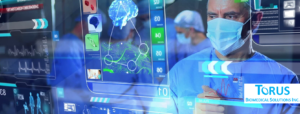
Full-stack Software Engineer – Medical Image Analysis
We are seeking a Full Stack Software Engineer to advance the development of intraoperative image analysis software for orthopedic surgery. This position will involve utilizing state-of-the-art image processing, machine learning, and modern software architectures to deliver real-time, high-performance solutions for surgical environments. As a leader in revolutionizing intraoperative medical imaging, Torus Biomedical has established a strong track record of success in creating innovative imaging tools for spine surgery. We are looking for a skilled engineer to help tackle the new challenges in orthopedic surgery and drive this next phase of innovation.
Key Responsibilities:
- Design and develop intraoperative image analysis software.
- Apply image processing and machine learning techniques to near real-time image analysis.
- Implement software architectures (MVVM, MVC, MVP) tailored to the development of medical devices.
- Utilize Agile methodologies for efficient project management, sprint planning, and continuous improvement.
- Manage code repositories and collaborate using Git and GitHub or similar tools
- Conduct testing, debugging, and code reviews to ensure software meets regulatory standards.
- Implementing front-end applications using Python frameworks such as PyQt, Tkinter, or Dash for UI and surgical data visualization.
- Collaborate closely with cross-functional teams, including surgeons, engineers, and data scientists, to deliver reliable and high-performance software solutions for surgical environments.
Qualifications:
- Bachelor’s or Master’s degree in Computer Science, Biomedical Engineering, or a related field.
- Knowledge and experience of software architecture patterns such as MVVM, MVC, and MVP
- Experience in full-stack software development, with a focus on medical image analysis and computer vision.
- Proficiency in Python, including front-end tools like PyQt, Tkinter, Dash, or similar frameworks.
- Strong understanding of software development best practices, including Agile methodologies.
- Experience with Git, GitHub, and version control tools for collaborative development.
- Familiarity with Matlab and Matlab based Image-Analysis and Optimization Toolboxes in a plus
- Experience in healthcare, medical technology, or surgical environments is a plus.
- Preferred experience with IEC 62304 standard for developing medical device software and life cycle
Join us in our mission to transform the future of intraoperative medical imaging and make a positive impact on patient care. If you are passionate about leveraging machine learning to solve complex problems in healthcare, submit your resume and a cover letter outlining your relevant experience to jobs@torusbiomedical.com.
Collaborative Postdoctoral Position – Medical Imaging AI
We have an outstanding opportunity for a Postdoctoral Research Associate to engage in a closely collaborative research and development project with our academic partner at the Department of Radiology – University of British Columbia. The goal of this project is to develop a software solution that facilitates automatic image-based measurements within an existing intraoperative assessment product.
Job Responsibilities:
- Conduct literature reviews and contribute to academic publications resulting from the project.
- Establish pipelines for generating synthetic fluoroscopic images/labeling from CT images.
- Design, develop, and optimize a convolutional neural network model tailored for automatic bone and implant segmentation, and annotation of key bone landmarks.
- Collaborate with interdisciplinary teams to ensure seamless integration of research outcomes into the final product.
- Participate in design and execution of performance testing and validation activities.
- Lead authorship efforts for organizing and publishing the research outcomes as white-papers, scientific abstracts and journal articles.
Job Qualifications:
- PhD in Computer Science, Biomedical Engineering, or a related field.
- Proficiency in Python-based machine learning, image processing and computer vision toolboxes (such as PyTorch, OpenCV, or scikit-image).
- Verifiable previous experience in applying machine learning to medical imaging, preferably with X-ray image modality.
- Track record of industrial product development experience or first author publications.
- Effective communication skills in English.
More information about the position and instructions for application is available at the following link: Postdoc_Job_Position_UBC_Torus
